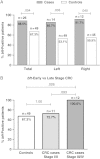The Bacteroides fragilis toxin gene is prevalent in the colon mucosa of colorectal cancer patients
- PMID: 25305284
- PMCID: PMC4351371
- DOI: 10.1093/cid/ciu787
The Bacteroides fragilis toxin gene is prevalent in the colon mucosa of colorectal cancer patients
Abstract
Background: Enterotoxigenic Bacteroides fragilis (ETBF) produces the Bacteroides fragilis toxin, which has been associated with acute diarrheal disease, inflammatory bowel disease, and colorectal cancer (CRC). ETBF induces colon carcinogenesis in experimental models. Previous human studies have demonstrated frequent asymptomatic fecal colonization with ETBF, but no study has investigated mucosal colonization that is expected to impact colon carcinogenesis.
Methods: We compared the presence of the bft gene in mucosal samples from colorectal neoplasia patients (cases, n = 49) to a control group undergoing outpatient colonoscopy for CRC screening or diagnostic workup (controls, n = 49). Single bacterial colonies isolated anaerobically from mucosal colon tissue were tested for the bft gene with touch-down polymerase chain reaction.
Results: The mucosa of cases was significantly more often bft-positive on left (85.7%) and right (91.7%) tumor and/or paired normal tissues compared with left and right control biopsies (53.1%; P = .033 and 55.5%; P = .04, respectively). Detection of bft was concordant in most paired mucosal samples from individual cases or controls (75% cases; 67% controls). There was a trend toward increased bft positivity in mucosa from late- vs early-stage CRC patients (100% vs 72.7%, respectively; P = .093). In contrast to ETBF diarrheal disease where bft-1 detection dominates, bft-2 was the most frequent toxin isotype identified in both cases and controls, whereas multiple bft isotypes were detected more frequently in cases (P ≤ .02).
Conclusions: The bft gene is associated with colorectal neoplasia, especially in late-stage CRC. Our results suggest that mucosal bft exposure is common and may be a risk factor for developing CRC.
Keywords: Bacteroides fragilis toxin; colorectal cancer; enterotoxigenic Bacteroides fragilis; mucosal microbiota.
© The Author 2014. Published by Oxford University Press on behalf of the Infectious Diseases Society of America. All rights reserved. For Permissions, please e-mail: journals.permissions@oup.com.
Figures

References
Publication types
MeSH terms
Substances
Grants and funding
LinkOut - more resources
Full Text Sources
Other Literature Sources
Medical

